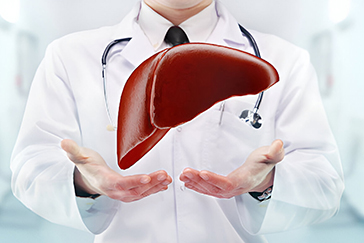 Book Appt.
Book Appt.
 Call Now
Call Now


Autoimmune hepatitis is a chronic liver disease caused by an immune system error. Your immune system sends antibodies to your liver tissues, which causes inflammation (hepatitis). These antibodies are generally designed to combat infections in your liver tissues. However, with autoimmune illness, your immune system mistakenly assaults healthy cells. Autoimmune hepatitis produces persistent inflammation in the liver, which can cause significant damage over time. Autoimmune hepatitis, like other kinds of chronic hepatitis, can cause liver tissue scarring (cirrhosis). Medical treatment can help reduce inflammation and prevent complications from arising. However, in the early phases of the condition, you may not have symptoms.
Two main types of autoimmune hepatitis
The various kinds of autoimmune hepatitis (AIH) include different autoantibodies that scientists can identify using an antibody test. These antibodies target different sorts of cells in your liver.
Type 1
Type 1 AIH, or the classic type, is also the most frequent. It accounts for around 80% of diagnosed cases and can affect anyone. Type 1 involves anti-smooth muscle antibodies (ASMA), which attack smooth muscle cells in the organ of the liver. Type 1 is often known as lupoid hepatitis because its clinical signs match those of systemic lupus erythematosus. An ASMA blood test can assist distinguish between the two.
Type 2
Type 2 AIH is rarer and more severe. It appears early, usually in youth, and advances more quickly than type 1. Type 2 antibodies are anti-liver-kidney microsome type 1 (anti-LKM-1), or anti-liver cytosol type 1 (anti-LC1). Anti-LKM-1 antibodies target a protein in your liver cells known as cytochrome P450-2D6 (CYP2D6). Anti-LC1 antibodies are liver antibodies that are specific for type 2 AIH.
Symptoms
Some common early symptoms are:
Causes
Autoimmune disorders develop when your immune system misinterprets some of your own cells as a threat. Once your immune system recognizes this threat, it continues to target these cells, resulting in persistent inflammation in specific areas of your body. In autoimmune hepatitis, your immune system produces particular antibodies that assault certain types of liver cells.
How do you develop autoimmune hepatitis?
Why people get autoimmune diseases is a complicated question. There seem to be multiple factors involved. In many cases, certain genes appear to make you more susceptible to developing certain autoimmune disorders. But not everyone with those genes develops the disease, and not everyone who develops it has those genes. Other nongenetic factors, called environmental factors, also contribute. Environmental factors are toxins or events that stress your immune system. In certain susceptible individuals, these factors may trigger an overactive immune response that manifests as a chronic autoimmune disease. Triggers linked to autoimmune hepatitis include certain drugs and certain viral infections. You’re also more susceptible if you have another autoimmune disease.
Diagnosis
You may or may not exhibit visible signs or symptoms of AIH. A healthcare provider will start by performing a physical exam and some regular testing, like imaging and blood tests. A blood test known as a comprehensive metabolic panel will reveal evidence of liver disease. The panel includes a variety of liver function tests, which detect liver enzymes and inflammation, among other things. However, these signs are not particular to autoimmune hepatitis. Your clinician will perform additional blood tests to look for specific viruses and other causes of hepatitis. They will also search for antibodies. When they've ruled out other possibilities and found the antibodies associated with autoimmune hepatitis, they'll be able to confirm the diagnosis. The easiest approach to accomplishing this is with a liver biopsy.
Treatment
The conventional treatment is to start with a high dose of corticosteroids to reduce inflammation and suppress the inflammatory response, and then gradually taper off. Prednisone is the most widely administered and investigated treatment for autoimmune hepatitis. It is effective for the majority of people; however, it may have negative effects. Alternatives, such as budesonide, appear to have fewer. Your doctor may prescribe an immunosuppressant called azathioprine in conjunction with steroids or after you have completed your steroid treatment. Because azathioprine has fewer side effects than steroids, it is more suited for long-term maintenance therapy, preventing your immune system from becoming overactive again. It's possible that you'll have to wear it on and off throughout your life.
Conclusion
Autoimmune hepatitis is a chronic but curable disease in which the immune system erroneously targets the liver. Early diagnosis and treatment are crucial in avoiding major consequences like cirrhosis and liver failure. While the specific origin of autoimmune hepatitis is unknown, advances in medical treatment have dramatically improved the prognosis for patients suffering from this disorder. If you suspect you have autoimmune hepatitis or are experiencing signs of liver malfunction, you should consult a healthcare provider for an evaluation and potential treatment options. Individuals suffering from autoimmune hepatitis can live active, full lives with the proper treatment.
SHALBY Sanar International Hospitals provides extensive medical procedures backed up with our state-of-the-art technology and a team of highly qualified & experienced clinical experts.
Our doctors pen down their research findings and experiences from time to time. Their words provide deep insight into the latest techniques, technologies and other advancements in healthcare. It provides expert answers to all kinds of health questions for real-life issues.
VIEW ALL




Since the day of its foundation, SHALBY Sanar International Hospitals is committed to provide comprehensive healthcare services. It regularly organizes awareness programs in its premises and encourages outdoor healthcare activities and camps with an intent to put focus on preventive healthcare.
VIEW ALL